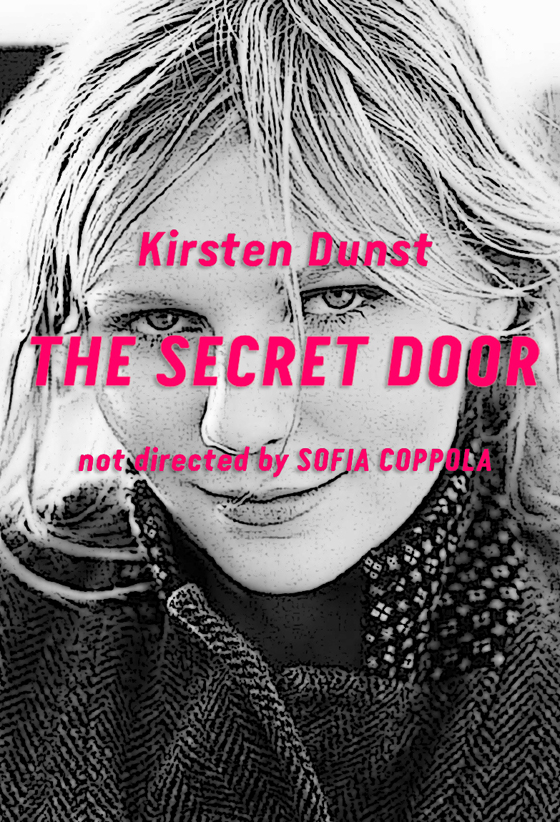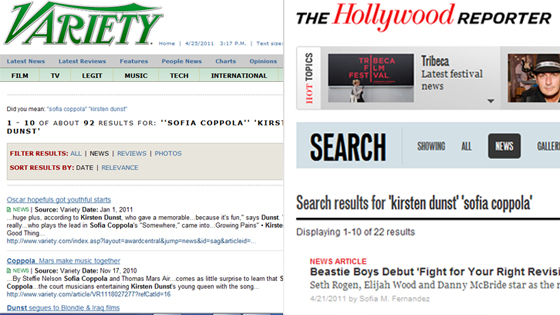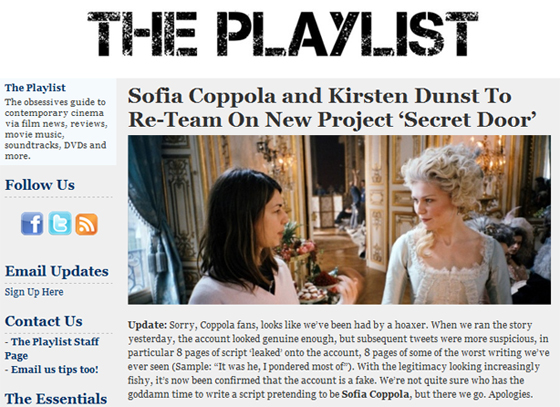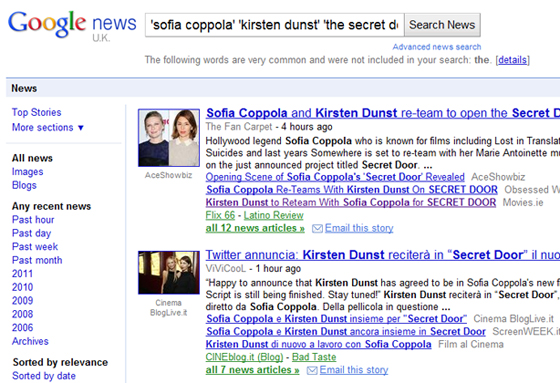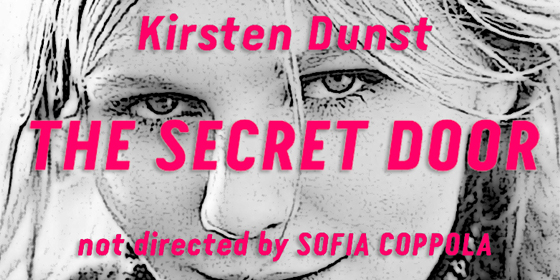
How does news about a fake Sofia Coppola film spread on the web?
Pretty quickly as it turns out.
First, The Playlist (usually one of the better film news sites) spots what appeared to be the official Twitter account of American Zoetrope (Coppola’s usual production company) which ‘announced‘:
Happy to announce that Kirsten Dunst has agreed to be in Sofia Coppola’s new film ‘Secret Door’. Script is still being finished. Stay tuned!
However, it turned out that it was probably a hoax account. (Note that this was the only tweet on the account and it doesn’t appear to be linked to Zoetrope’s official site).
Then there was the 8 pages of a supposed screenplay that was uploaded to Mediafire:
The very idea of Coppola (or someone at Zoetrope) uploading part of her screenplay to the web and then announcing it to the world on Twitter seems highly unlikely to me.
There also appeared to be no mention of the story from trade sites such as Variety, The Hollywood Reporter or Deadline (although searching on the traditional trades made me think they need to hire someone to build a more usable archive).
To their credit, The Playlist subsequently corrected their original story
“Sorry, Coppola fans, looks like we’ve been had by a hoaxer. When we ran the story yesterday, the account looked genuine enough, but subsequent tweets were more suspicious, in particular 8 pages of script ‘leaked’ onto the account, 8 pages of some of the worst writing we’ve ever seen (Sample: “It was he, I pondered most of”). With the legitimacy looking increasingly fishy, it’s now been confirmed that the account is a fake. We’re not quite sure who has the goddamn time to write a script pretending to be Sofia Coppola, but there we go. Apologies”
But a quick Google News search reveals that many sites picked up the original, uncorrected version of the story:
One site even said:
It’s extremely tough to write a news article when all the details are being kept secret.
Quite.
But this whole affair does raise some interesting questions.
Does bad news stick, even if quickly corrected?
You could argue that the crowd-sourcing nature of sites like Twitter and Facebook, helped to quickly flag this as being a false story and that sites can quickly admit to honest errors (which in this case happened).
But are parts of the web just an unthinking copy-and-paste machine?
With large site owners like AOL relentlessly pressing for page views, maybe writers will find it hard to resist quickly feeding readers a diet of stories, which don’t always completely check out.
Can traditional outlets devoted to accuracy, like the New York Times and the Wall Street Journal, edit and fact check for several days? Probably not. There is some kind of balance to be struck, but the line seems blurry.
This isn’t just a blogger vs traditional journalist issue either.
When composer Maurice Jarre died in March 2009, some news organisations copied an erroneous quote planted on Wikipedia by a Dublin university student who, according to MSNBC, wanted to test “accuracy and accountability in an age of instant news”.
The online encyclopedia actually corrected itself quicker than many traditional outlets.
As Shawn Pogatchnik of the AP said:
Wikipedia passed. Journalism flunked.
What strikes me from the fake Sofia Coppola movie is the slippery nature of information on the web and the ease with which it was absorbed into the news cycle.
Think about it. Someone actually took the time to create a fake Twitter account for a production company, write 8 pages of screenplay and, presumably, alert some websites of it.
Like a cyber-pinball, that false information rattles around blogs, social media and possibly printed outlets too.
When it comes to information about films, perhaps things are even more confused as we live in an age where even documentaries are deliberately confusing people.
For a long time no-one was really sure if I’m Still Here was actually depicting Joaquin Phoenix having a real meltdown or spoofing how the media were covering a fake one.
Banksy’s Exit Through The Gift Shop played similar games about the nature of modern art and the persona of its director, even to the point of mounting one of the most original Oscar campaigns ever.
At the same time, directors of major films are increasingly plugged into virtual engagement with their audiences.
Jon Favreau openly posts pictures from the set of Cowboys and Aliens, Duncan Jones responds to critics of Source Code, and Peter Jackson makes official announcements of The Hobbit from his Facebook page.
Even a traditional studio like Warner Bros played around with genuine and fake viral videos when marketing a blockbuster like Inception.
Although only a small fraction of the films total audience would have seen them, they presumably wanted to monitor reactions to the mystery surrounding the film, as well use the enigma of the film as a marketing tool.
It would strike me as odd if Coppola and Zoetrope actually did start an official Twitter feed on which to make announcements and maybe after this fake story they should, just to get their official voice out there.
But let’s go further down the rabbit hole.
Could it be conceivable that Sofia Coppola and American Zoetrope hired some kind of viral marketing guru to create a fake movie called ‘The Secret Door’?
Personally I don’t think so, but if they did would the poster look something like this?
Although I should stress the above image isn’t real, perhaps this whole episode highlights the immediacy of information in the modern age and how it might be used (or abused) by individuals, studios and filmmakers in the future.
Could some digital prankster actually make a fake Sofia Coppola movie, imitating her visual style, recreating marketing materials on Photoshop and then upload it to YouTube?
Since the rise of the web in the mid-to-late 90s, films like The Matrix (1999), Avatar (2009) and Inception (2010) have played around with the idea of ‘dual realities’.
But maybe they, the current batch of ‘fake documentaries’ and even a non-existent project like ‘The Secret Room’ also signify a growing cultural trend.
As we read our web connected devices aren’t we experiencing an uncertain virtual world, as we cautiously rely on information reproduced over a vast, digital echo chamber?
> Original story about The Secret Room at The Playlist
> More on Sofia Coppola at Wikipedia and the IMDb
